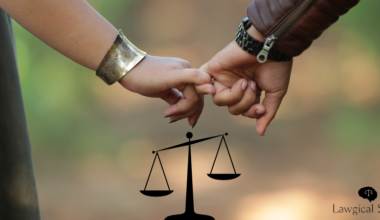When most of the people hear the term “contract,” the first thing comes into their mind, a complicated legal document full of difficult words. Some people think that contracts are only for big business deals, celebrities, or lawyers. But the truth is that contracts are a part of our daily lives. From buying a needle, renting a house, to using a mobile phone, everywhere is a contract. Contracts help make our lives more organized, fair, and secure. That is why, understanding the importance of contracts in daily life, and being legally aware is crucial. Here is an illuminating session on daily-life contracts. For that, knowing what makes a contract is equally important.
What is a Contract?
A contract is an agreement between two or more people or parties, which is legal and enforceable by law. In simple words, when two parties agree to do something for each other, and both of them accept the terms, then it becomes a contract.
A contract can be expressed (Written) or implied (through actions). Though written contracts are more common and safer, but verbal agreements can also be considered as contracts in certain situations such as:
- When you buy a movie ticket, there’s a contract – you pay money, and the theatre lets you watch the movie.
- When you hire a plumber to fix a leak, and agree on a price, that’s a contract.
- Even going to salon to get a haircut for specific charges is a contract.
What Makes a Contract Valid?
For a contract to be legally valid, a few key elements must be present:
- Offer and Acceptance: One person makes an offer, and the other accepts it.
- Intention to Create Legal Relations: There should be clear intention between both the parties to come into a contract.
- Consideration: Something of value (like money, services, or goods) is exchanged.
- Capacity to contract: The people involved must be of sound mind and major.
- Free Consent: Agreement must be of free consent and free from undue influence, fraud, or misrepresentation.
If any of these are missing, the contract may not be legally valid.
Why Are Contracts Important?
- Clarity in Agreements: Contracts provide clarity in agreements by clearly mentioning the terms of an agreement. This ensures that everyone understands their roles, responsibilities, and expectations, which prevent misunderstandings and disputes. For example, if you hire a painter to paint the house, a contract can have the details such as:
– Colours to be used,
– Specific area to be painted,
– Timeline for the completion of work,
– Total cost of the project.
when everything clearly written, no one can later claim, “I didn’t know that!” This clarity in contracts is essential for smooth and transparent dealings in both personal and professional life. - Contracts Protect Your Rights: Contracts protect one’s legal rights when things go wrong. For example, if you buy a sofa online but received the wrong one or no delivery at all, then a written agreement, such as a receipt or order confirmation, becomes proof of the contract. With this receipt, you can demand to resolve the issue or take legal action if required. There is the importance of contracts for consumer protection, everyday transactions, etc.
- Contracts Build Trust: When two people sign a contract, it reflects mutual trust and accountability. Trust is important in business relationship, personal arrangement, and even in family agreement. Example, a rental contract between the landlord and a tenant which ensures that the both sides understand their responsibilities, promotes fairness and harmony. Having clear contract terms reduces the chance of misunderstandings, prevent dispute and strengthen relationships and trust.
- Contracts Help in Resolving Disputes: Even when everyone acts in good faith, disputes can arise. Contracts serve as a clear reference point to resolve disagreements. They answer key questions like:
- What was the terms of agreement?
- What happens if someone breaches the contract?
By providing this structure, contracts help settle disputes without emotional arguments or confusion. Whether in business or personal life, having a written agreement makes it easier to find fair and legal solutions when problems occur.
Examples of Contracts in Daily Life
Here are some common examples where contracts play a role in everyday life:
1. Mobile Phone Services
When you get a new phone or internet connection, you agree to certain terms—monthly bills, data limits, contract duration, etc. You may not read the full agreement, but it’s a contract between you and the service provider.
2. Employment
When you take a job, you sign an employment contract. It states your salary, working hours, duties, leave policies, and more. This protects both you and your employer against unwarranted behaviours.
3. Buying Goods and Services
Whether it’s groceries, clothes, or electronics, you make a contract with the seller. You pay the price, and they provide the product or service. If the product is defective, you can ask for a replacement or refund—because of the contract.
4. Renting a House
A rental agreement is a clear contract. It outlines how much rent you’ll pay, how long you’ll stay, who pays for repairs, and other terms. It protects both the landlord and the tenant against unwanted arguments.
5. Online Transactions
Every time you click “I agree” to terms and conditions online, while accessing apps, games, or e-commerce sites, you’re entering into a contract. These contracts usually involve your rights as a user and responsibilities of the service provider.
What Happens If Someone Breaks a Contract?
Breaking or backing out from the terms of a contract is called a breach of contract. This means one person didn’t do what they promised. In such cases, the other party can take legal action. The court may:
- Order the person to fulfil the promise.
- Award compensation for the loss.
- Cancel the contract if it’s no longer possible to carry it out.
For example, if a wedding photographer takes payment but doesn’t show up, the couple can ask for their money back and even get additional compensation for the agony.
Things to be Kept in Mind About Contracts in Daily Life
- Read Before You Sign: Never sign a contract without understanding it. If it’s confusing, ask questions or get help. In case of oral arrangements, know what you are getting into, by discussing all the terms and responsibilities.
- Keep Copies: Always keep a copy of any agreement or receipt. It can save you later.
- Be Honest: Don’t make promises you can’t keep. If you break a contract, it can lead to trouble.
- Put It in Writing: While verbal agreements can work, written ones are easier to prove and enforce.
- Know Your Rights: Many consumer laws protect you in everyday contracts. For instance, you have the right to return faulty goods. Being legally aware is your ultimate shield.
Conclusion
Contracts may sound formal and complicated, but they are part of nearly everything we do. From shopping online to hiring a taxi, we make small contracts every day. These agreements make our lives smoother, protect us from unfair treatment, and help us hold others accountable. Therefore, importance of contracts in daily life cannot be denied.
Understanding the basics of contracts empowers you to make better decisions. You don’t need to be a lawyer to protect yourself, you just need to be aware, alert, and informed. So next time you rent an apartment, take a new job, or subscribe to a service, remember: you’re entering a contract, and that contract matters more than you think.








